Imperial election
The election of a Holy Roman Emperor or King of Germany was, from at least the 13th century, accomplished by a small body of the greatest princes of the Empire, the Prince-electors. Appointment as Emperor was normally for life. In 1356, the Emperor Charles IV, promulgated the Golden Bull, which became the fundamental law by which all future Kings and Emperors were elected.
| Prince-electors: | |
|---|---|
| Elections: | |
| 14th century | |
| 15th century | |
| 16th century | |
| 17th century | |
| 18th century | |
| External links | |
Prince-electors

The seven electors who chose the Emperor, or, in some cases, the King of the Romans — the Emperor's designated heir — were:
Spiritual electors
Secular electors
- The King of Bohemia, of the House of Luxembourg at the time of the Golden Bull, but from 1526 onward ruled by the House of Habsburg. The Bohemian crown itself was also theoretically elective, but under the Habsburgs it became hereditary de facto.
- The Count Palatine of the Rhine, throughout the entire period a member of the House of Wittelsbach
- The Duke of Saxony, from 1356 a member of the House of Ascania; from 1423, a member of the House of Wettin
- The Margrave of Brandenburg, from 1356 a member of the House of Wittelsbach; from 1373, a member of the House of Luxembourg; from 1415, a member of the House of Hohenzollern.
Subsequent changes
Later additions to the electoral council were:
- The Duke of Bavaria; of another branch of the House of Wittelsbach.
- The Duke of Brunswick-Lüneburg (also known as the Elector of Hanover) of the House of Welf.
Listed below are all the elections that took place under the conditions of the Golden Bull, as are expulsions, readmittances, and additions to the electoral council.
14th century
Election of 1376
The 1376 election took place on June 10 in Frankfurt.
Electors
- Louis of Meissen, Elector of Mainz (1374–1379)
- Kuno II von Falkenstein, Elector of Trier (1362–1388)
- Friedrich III von Saarwerden, Elector of Cologne (1372–1414)
- Charles, King of Bohemia (1346–1378) and Emperor
- Rupert I, Elector Palatine (1356–1390)
- Wenceslaus, Elector of Saxony (1370–1388)
- Wenceslaus, Elector of Brandenburg (1373–1378)
Elected
Wenceslaus of Bohemia, King of the Romans.
This was the first election to be carried out following the enactment of the Golden Bull, which laid out in exact terms the qualifications of the electors, the manner of holding elections and was the basis of every election thenceforward. Wenceslaus, son of Emperor Charles IV, and then holding the dignity of Elector of Brandenburg, was elected as Charles's heir, King of the Romans. He succeeded as king when Charles died two years later on November 29, 1378, at which point he also became King of Bohemia.
First election of 1400
The first election in 1400 took place on May 22 in Frankfurt.
Electors
- Johann II von Nassau, Elector of Mainz (1396–1419)
- Werner von Falkenstein, Elector of Trier (1388–1418)
- Friedrich III von Saarwerden, Elector of Cologne (1372–1414)
- Rupert III, Elector Palatine (1398–1410)
- Rudolf III, Elector of Saxony (1388–1419)
- Jobst, Elector of Brandenburg (1388–1411)
Elected
Frederick I, Duke of Brunswick-Lüneburg.
Dissatisfied with Wenceslaus's performance of his duties as King of Germany, the electors met to consider alternatives. Frederick of Brunswick-Lüneburg was elected in opposition to Wenceslaus. However, the three spiritual electors of Mainz, Trier, and Cologne, (and of course Wenceslaus himself) did not concur with the election, which was therefore legally invalid, as supported by only a minority of the electors. Frederick was assassinated two weeks later, on June 5, 1400.
Second election of 1400
The second election in 1400 took place on August 21 in Rhens-am-Rhein.
Electors
- Johann II von Nassau, Elector of Mainz (1396–1419)
- Werner von Falkenstein, Elector of Trier (1388–1418)
- Friedrich III von Saarwerden, Elector of Cologne (1372–1414)
- Rupert III, Elector Palatine (1398–1410)
Elected
Rupert, Elector Palatine (as Rupert III) and King of Germany (as Rupert I).
The three spiritual electors and Rupert met again to formally depose King Wenceslaus on August 20, 1400. The next day Rupert was chosen unanimously as the new King of Germany. However, the Elector of Saxony (Rudolph III, 1388–1419), the Elector of Brandenburg (Jobst, 1388–1411) and the King of Bohemia (Wenceslaus, 1378–1419) were not present, and Wenceslaus never admitted the validity of his deposition and the election of Rupert.
15th century
Elections of 1410
The two elections in 1410 took place on September 20 and October 1.
Electors
- Johann II von Nassau, Elector of Mainz (1396–1419)
- Werner von Falkenstein, Elector of Trier (1388–1418)
- Friedrich III von Saarwerden, Elector of Cologne (1372–1414)
- Wenceslaus IV, King of Bohemia (1378–1419)
- Louis III, Elector Palatine (1410–1436)
- Rudolf III, Elector of Saxony (1388–1419)
- Jobst, Elector of Brandenburg (1388–1411)
Elected
Sigismund and Jobst of Moravia.
These elections followed the death of Rupert, King of Germany, on May 18, 1410. On September 20, three of the electors irregularly proclaimed Sigismund, King of Hungary, the son of the late Emperor Charles IV as King. They included Frederick, Burggrave of Nuremberg, acting on behalf of Sigismund and claiming to represent the Electorate of Brandenburg, but not authorized by the then-current Margrave, Jobst of Moravia, the late Emperor's nephew.
The doubtful election of Sigismund in September was not accepted by the remaining electors. On October 1, 1410, they elected Jobst of Moravia in opposition to his cousin Sigismund, but Jobst died only three months later. The elections of 1410 were the last to result in a competing king and anti-king.
Election of 1411
The 1411 election took place on July 21.
Electors
- Johann II von Nassau, Elector of Mainz (1396–1419)
- Werner von Falkenstein, Elector of Trier (1388–1418)
- Friedrich III von Saarwerden, Elector of Cologne (1372–1414)
- Wenceslaus IV, King of Bohemia (1378–1419)
- Louis III, Elector Palatine (1410–1436)
- Rudolf III, Elector of Saxony (1388–1419)
- Sigismund, Elector of Brandenburg (1411–1415), also King of Hungary
Elected
Sigismund, King of Germany.
Following the death of Jobst on January 18, 1411, there was no further obstacle to Sigismund (now undisputed Elector of Brandenburg) being accepted as King by all the electors. An election was duly held after six months. By accepting this election, Sigismund tacitly admitted to the invalidity of his election in 1410.
Election of 1438
The 1438 election took place on March 18 in Frankfurt.
Electors
- Dietrich Schenk von Erbach, Elector of Mainz (1434–1459)
- Raban von Helmstatt, Elector of Trier (1430–1439)
- Dietrich II von Mors, Elector of Cologne (1414–1463)
- Louis IV, Elector Palatine (1436–1449)
- Frederick II, Elector of Saxony (1428–1464)
- Frederick I, Elector of Brandenburg (1415–1440)
Elected
Albert, King of Germany.
This election followed the death of Emperor Sigismund on December 9, 1437.
Albert, the elected King, though nominally King of Bohemia by virtue of his marriage to Elizabeth of Luxembourg, was not crowned until after the election. As he was fighting the Bohemians at the time, Albert was not present at his own election.
The Electorate of Brandenburg was conferred in 1415 upon the House of Hohenzollern, where it remained until the end of the Empire.
Election of 1440
The 1440 election took place on February 2 in Frankfurt.
Electors
- Dietrich Schenk von Erbach, Elector of Mainz (1434–1459)
- Jakob von Sierk, Elector of Trier (1439–1456)
- Dietrich II von Mors, Elector of Cologne (1414–1463)
- Louis IV, Elector Palatine (1436–1449)
- Frederick II, Elector of Saxony (1428–1464)
- Frederick I, Elector of Brandenburg (1415–1440)
The place of the King of Bohemia at this election was vacant, because the previous king Albert had died (October 27, 1439) leaving his wife Elisabeth pregnant. Their child, Ladislaus the Posthumous, was not born until February 22, 1440, twenty days after the election.
Elected
Frederick III, King of Germany.
Frederick was the last German king to be crowned Emperor in Rome by the Pope, on March 19, 1452. He was the lineal ancestor of all subsequent Habsburg Emperors.
Election of 1486
The 1486 election took place on February 16 in Frankfurt.
Electors
- Bertold von Henneberg-Römhild, Elector of Mainz (1484–1504)
- John II of Baden, Elector of Trier (1456–1503)
- Hermann IV of Hesse, Elector of Cologne (1480–1508)
- Vladislaus II, King of Bohemia (1471–1516)
- Philip, Elector Palatine (1476–1508)
- Ernest, Elector of Saxony (1464–1486)
- Albert III, Elector of Brandenburg (1470–1486)
Elected
Maximilian I, King of the Romans.
Maximilian, Archduke of Austria, was elected King of the Romans, and succeeded his father, Frederick III, on the latter's death on August 19, 1493. As wars in Italy made it impossible for Maximilian to undertake the journey to Rome for the Imperial coronation, on February 4, 1508 at Trent, he claimed for himself the title of Electus Romanorum Imperator, "Elected Roman Emperor" or "Roman Emperor by election" (rather than by coronation), which was subsequently accepted (February 12, 1508) by Pope Julius II. Subsequent electees retained the right to call themselves Emperor, rather than merely King, without Papal coronation.
16th century
Election of 1519
The 1519 election took place on June 28 in Frankfurt. It was one of the most hotly contested elections of the later Empire.
Electors
- Albert of Mainz, Elector of Mainz (1514–1545)
- Richard von Greiffenklau zu Vollrads, Elector of Trier (1511–1531)
- Hermann of Wied, Elector of Cologne (1515–1546)
- Louis II Jagiellon, King of Bohemia (1516–1526), also King of Hungary
- Louis V, Elector Palatine (1508–1544)
- Frederick III, Elector of Saxony (1486–1525)
- Joachim I, Elector of Brandenburg (1499–1535)
Elected
Charles V, Holy Roman Emperor.
This election followed the death of Emperor Maximilian on January 12, 1519. There was no German contender; the two main candidates were Charles, a Duke of Burgundy who had recently become King of Spain, and Francis I, the King of France. Running as a dark-horse candidate was Henry VIII, King of England. Although Charles was a Habsburg by paternal ancestry, (his father was Philip , the son of emperor Maximilian, and his mother, Joanna of Castile was the heiress of both Castile and León and Aragon ] and though the grandson of the late Emperor, Charles had grown up in Burgundy, lived in modern-day Spain, and he spoke French, and Dutch, though not German, and was felt to be as much of a foreigner as Francis. While electing an emperor, who was also the ruler of a foreign power, had not happened since the ruler of Sicily, Frederick II, was elected in 1211, France and the Empire had not been joined since the days of the Carolingian dynasty.
Charles and Francis tried to outdo each other in voluminous bribes; Charles in the end had deeper pockets. Charles could count on the vote of the King of Bohemia, his brother-in-law; Francis had bought the Elector of Trier; up for grabs were the Electors of Mainz, Brandenburg and the Palatinate. Although full details of the election were never revealed, it is possible that the Electors sought a way out of their dilemma by electing as Emperor the Elector of Saxony, but that he turned them down. In the end, Charles was elected unanimously, though with some misgivings by the Elector of Brandenburg.
Election of 1531
The 1531 election took place on January 5, 1531 in Cologne.
Electors
- Albert of Mainz, Elector of Mainz (1514–1545)
- Richard von Greiffenklau zu Vollrads, Elector of Trier (1511–1531)
- Hermann of Wied, Elector of Cologne (1515–1546)
- Ferdinand, King of Bohemia (1526–1564), also King of Hungary
- Louis V, Elector Palatine (1508–1544)
- John, Elector of Saxony (1525–1532)
- Joachim I, Elector of Brandenburg (1499–1535)
Elected
Ferdinand I, King of the Romans.
Charles V, who had realized that the entirety of the Habsburg dominions could not be ruled by one man, had settled the rule of the original Habsburg lands in Austria upon his brother Ferdinand (who, in 1526, also became King of Bohemia and Hungary). While Charles would have liked the Imperial crown to pass to his own son Philip, the German princes, having had experience of an Emperor who was rarely in the Empire (at a time of both internal religious strife, and external threats from the Ottoman Turks), lobbied instead for Ferdinand. As a compromise, Charles acquiesced in the election of Ferdinand as his heir (King of the Romans), with the stipulation that Philip should succeed Ferdinand (though this did not in fact happen). Despite being elected in 1531, Ferdinand had to wait over a quarter-century before succeeding as Emperor with Charles's abdication in 1558.
The election took place in the middle of the Protestant Reformation, with the first splits appearing between Catholic and Protestant electors. The electors of Mainz and Brandenburg were strongly pro-Catholic, while the elector of Saxony was a Lutheran since 1527; the elector of Cologne, though a bishop, showed Reforming tendencies, and would eventually be deposed from his episcopate in 1546. At this point, however, it was still far from certain that a compromise between Catholics and Lutherans could not be reached.
Election of 1562
The 1562 election took place on November 28 in Regensburg.
Electors
- Daniel Brendel of Homburg, Elector of Mainz (1555–1582)
- Johann V von der Leyen, Elector of Trier (1556–1567)
- Friedrich IV of Wied, Elector of Cologne (1562–1567)
- Ferdinand, King of Bohemia (1526–1564), Emperor and also King of Hungary
- Frederick III, Elector Palatine (1559–1576)
- Augustus, Elector of Saxony (1553–1586)
- Joachim II, Elector of Brandenburg (1535–1571)
Elected
Maximilian II, King of the Romans.
This election took place during the lifetime of Emperor Ferdinand I. Maximilian, elected as King of the Romans succeeded as Emperor on Ferdinand's death less than two years later on July 25, 1564.
This was the first election in which a member of the Albertine line of Saxon electors participated; they had displaced the elder, Ernestine line in 1547.
By 1562, the divisions between Catholic and Protestant had become entrenched in the Empire. The spiritual electors remained Catholic, as did the King of Bohemia. The Elector Palatine, however, had become a Calvinist Protestant in 1561; the Saxon elector was Lutheran, as was the elector of Brandenburg, who had converted to Lutheranism in 1555.
Election of 1575
The 1575 election took place on October 27 in Regensburg.
Electors
- Daniel Brendel of Homburg, Elector of Mainz (1555–1582)
- Jakob III of Eltz-Rübenach, Elector of Trier (1567–1581)
- Salentin VI, of Isenburg, Elector of Cologne (1567–1577)
- Maximilian, King of Bohemia (1564–1576), Emperor and also King of Hungary
- Frederick III, Elector Palatine (1559–1576)
- Augustus, Elector of Saxony (1553–1586)
- John George, Elector of Brandenburg (1571–1598)
Elected
Rudolf II, King of the Romans.
Rudolph, then titular King of Hungary, was elected during the lifetime of his father Maximilian II as King of the Romans. When Maximilian died on October 12, 1576, Rudolph became Emperor.
Religious divisions among the electors remained as they had been at the previous election.
17th century
Election of 1612
The 1612 election took place on June 13 in Frankfurt.
Electors
- Johann Schweikhard von Kronberg, Elector of Mainz (1604–1626)
- Lothar von Metternich, Elector of Trier (1599–1623)
- Ferdinand of Bavaria, Elector of Cologne (1612–1650)
- Matthias, King of Bohemia (1611–1618), also King of Hungary
- Frederick V, Elector Palatine (1610–1623)
- John George I, Elector of Saxony (1611–1656)
- John Sigismund, Elector of Brandenburg (1608–1619)
Elected
The election followed the death of Emperor Rudolf II on January 20, 1612. Ferdinand of Bavaria promoted the election of his brother Maximilian, Duke of Bavaria as Emperor; however, Maximilian refused to accept the throne. Instead, Rudolph's next surviving brother, Matthias, who had already taken power in Bohemia and Hungary, was elected.
Religious divisions among the electors remained as they had been at the previous election.
Election of 1619
The 1619 election took place on August 28 in Frankfurt.
Electors
- Johann Schweikhard von Kronberg, Elector of Mainz (1604–1626)
- Lothar von Metternich, Elector of Trier (1599–1623)
- Ferdinand of Bavaria, Elector of Cologne (1612–1650)
- Ferdinand, King of Bohemia (1618–1637), also King of Hungary
- Frederick V, Elector Palatine (1610–1623), claimant to the crown of Bohemia
- John George I, Elector of Saxony (1611–1656)
- John Sigismund, Elector of Brandenburg (1608–1619)
Elected
Ferdinand II, Holy Roman Emperor.
This election, following the death of Emperor Matthias on March 20, 1619, occurred coincident with the beginning of the Thirty Years' War. Two days before the election, the Estates of Bohemia had deposed Ferdinand and elected Frederick, the Palatine Elector, as king of their nation. Nonetheless, the other Electors refused to hear a deputation from the Bohemian Estates and confirmed Ferdinand as Bohemian Elector, with only the Palatine delegation objecting. The Elector Palatine, after casting a vote for Maximilian I, Duke of Bavaria, retracted his vote and also voted for Ferdinand.
Coming just seven years after the previous election, the lineup of electors, save for the King of Bohemia, was identical to that of 1612, as were the religious affiliations of the electors.
Election of 1636
The 1636 election took place on December 22 in Regensburg.
Electors
- Anselm Casimir Wambold von Umstadt, Elector of Mainz (1629–1647)
- Philipp Christoph von Sötern, Elector of Trier (1623–1652)
- Ferdinand of Bavaria, Elector of Cologne (1612–1650)
- Ferdinand, titular King of Bohemia (1627–1646), also titular King of Hungary
- Maximilian I of Bavaria, Elector Palatine (1623–1648), Elector of Bavaria (1648–1651)
- John George I, Elector of Saxony (1611–1656)
- George William, Elector of Brandenburg (1619–1640)
Elected
Ferdinand III, King of the Romans.
This election took place during the course of the Thirty Years' War (1618–48), during the reign of Emperor Ferdinand II. His son, Ferdinand III, who had already been named King of Bohemia in 1627, was elected King of the Romans, and duly became Emperor on the death of his father less than three months later on February 15, 1637.
In 1621, early in the war, Frederick V, Elector Palatine was deprived of his electorate and territories; his son would not regain them until 1648. In February 1623, the electoral vote and office of the Palatinate were formally transferred to the Duke of Bavaria, a distant cousin. As the Bavarian elector was Catholic, the council of electors now consisted of five Catholics and two Lutherans.
Election of 1653
The 1653 election took place on May 31 in Augsburg.
Electors
- Johann Philipp von Schönborn, Elector of Mainz (1647–1673)
- Karl Kaspar von der Leyen-Hohengeroldseck, Elector of Trier (1652–1676)
- Maximilian Henry of Bavaria, Elector of Cologne (1650–1688)
- Ferdinand Maria, Elector of Bavaria (1651–1679)
- John George I, Elector of Saxony (1611–1656)
- Frederick William I, Elector of Brandenburg (1640–1688)
- Charles Louis, Elector Palatine (1648–1680)
- (Ferdinand, titular King of Bohemia (1646–1654), also titular King of Hungary)
Elected
Ferdinand IV, King of the Romans.
The election of Ferdinand as King of the Romans was intended to provide an heir to automatically succeed to the throne of Emperor Ferdinand III. However, Ferdinand died of smallpox on July 9, 1654, a year after his election.
This was the first election following the end of the Thirty Years' War. By the treaties ending that war, the Count Palatine of the Rhine was given a new Palatine electorate; however, the Duke of Bavaria retained the old Palatine electorate that had been given him in 1623, under the title of "Elector of Bavaria". There were now eight electors. To avoid the possibility of ties, the King of Bohemia (by now the presumptive favorite to win any election) agreed to abstain from participation in the electoral process, while retaining the Electoral title (marked here by placing the Bohemian elector in parentheses).
The electoral council now contained five Catholics (or four, without Bohemia), two Lutherans (Brandenburg and Saxony), and a Calvinist (the Palatinate). However, after the Thirty Years' War, religious differences played a smaller role in Imperial politics.
Election of 1658
The 1658 election took place on July 18 in Frankfurt.
Electors
- Johann Philipp von Schönborn, Elector of Mainz (1647–1673)
- Karl Kaspar von der Leyen-Hohengeroldseck, Elector of Trier (1652–1676)
- Maximilian Henry of Bavaria, Elector of Cologne (1650–1688)
- Ferdinand Maria, Elector of Bavaria (1651–1679)
- John George II, Elector of Saxony (1656–1680)
- Frederick William I, Elector of Brandenburg (1640–1688)
- Charles Louis, Elector Palatine (1648–1680)
- (Leopold, King of Bohemia (1656–1705), also King of Hungary)
Elected
Leopold I, Holy Roman Emperor.
This election followed on the death of Emperor Ferdinand III, on April 2, 1657, which was followed by the longest interregnum since the 13th century. This was largely a result of the youth of Ferdinand III's surviving son Leopold — he was only 17 at the time of his father's death, and it was generally considered that the Emperor had to be 18 years old. Cardinal Mazarin, the French prime minister, hoped to prevent Leopold's election, and to secure either the election of Louis XIV of France or, at least, to find an alternate candidate to the Habsburgs — perhaps Ferdinand Maria of Bavaria. These efforts were unsuccessful and Leopold was elected with little difficulty.[1]
Election of 1690
The 1690 election took place on January 23 in Augsburg.
Electors
- Anselm Franz von Ingelheim, Elector of Mainz (1679–1695)
- Johann Hugo von Orsbeck, Elector of Trier (1676–1711)
- Joseph Clemens of Bavaria, Elector of Cologne (1688–1723)
- Maximilian II, Elector of Bavaria (1679–1726)
- John George III, Elector of Saxony (1680–1691)
- Frederick I, Elector of Brandenburg (1688–1713)
- Philip William of Neuburg, Elector Palatine (1685–1690)
- (Leopold, King of Bohemia (1656–1705), Emperor and also King of Hungary)
Elected
This election took place while the Emperor Leopold I was still alive and during the War of the Grand Alliance. Leopold's son and successor, Joseph I, was crowned King of the Romans, but had to be content with this lesser title until the death of his father fifteen years later, on May 5, 1705. Joseph then became Emperor without opposition.
The inheritance of the Palatinate in 1685 by Philip William, head of a Catholic branch of the same family, now gave the electoral council six Catholic votes to two Lutheran ones.
18th century
Election of 1711
The 1711 election took place on October 12.
Electors
- Lothar Franz von Schönborn, Elector of Mainz (1694–1729)
- Charles Joseph of Lorraine, Elector of Trier (1711–1715)
- Charles, King of Bohemia (1711–1740), also King of Hungary and claimant to the throne of Spain
- John William, Elector Palatine (1690–1716)
- Frederick-Augustus I, Elector of Saxony (1694–1733), also King of Poland
- Frederick I, Elector of Brandenburg (1688–1713), also King in Prussia
- George I, Elector of Hanover (1698–1727)
Elected
Charles VI, Holy Roman Emperor.
This election followed on the death of Emperor Joseph I on April 17, 1711, and took place during the War of the Spanish Succession.
Since the election of 1690, several changes were made to the roster and character of the electors:
- In 1692, the Emperor conferred a ninth electorate ("of Hanover") upon Ernst August, Duke of Brunswick-Lüneburg-Calenburg, a Lutheran. This move initially met with considerable resistance, and the Imperial Diet did not immediately ratify the Emperor's choice.
- In 1697, Augustus II the Strong, Elector of Saxony converted to Catholicism, the better to pursue his campaign for the crown of Poland.
- The War of the Spanish Succession with France began in 1701. In 1702, the Elector of Bavaria, Maximilian II (1679–1726) came in on the French side. He was joined by his brother, the Elector of Cologne, Joseph Clemens of Bavaria (1688–1723).
- In 1703, the Elector of Cologne was forced to flee into exile in France, where he remained for the duration of the war. In 1706, both the Elector of Bavaria and the Elector of Cologne were deprived of their Electorates for taking the part of the Empire's enemies.
- At a meeting of the Imperial Diet in 1708, the two missing Electorates were compensated for by, first, approving the appointment of the Duke of Brunswick-Lüneburg as Elector of Hanover, and second, by readmitting the King of Bohemia to the electoral proceedings.
As the Saxon and Palatine electors were now Catholic, the addition of the Elector of Hanover prevented the Elector of Brandenburg from being the sole Protestant member of the Electoral college.
Election of 1742
The 1742 election took place on January 24 in Frankfurt.
Electors
- Philipp Karl von Eltz-Kempenich, Elector of Mainz (1732–1743)
- Franz Georg von Schönborn-Buchheim, Elector of Trier (1729–1756)
- Clemens August of Bavaria, Elector of Cologne (1723–1761)
- Charles Albert, Elector of Bavaria (1726–1745), also in possession of the Kingdom of Bohemia 1741–1743
- Frederick-Augustus II, Elector of Saxony (1733–1763), also King of Poland
- Frederick II, Elector of Brandenburg (1740–1786), also King in Prussia
- Charles III Philip, Elector Palatine (1716–1742)
- George II, Elector of Hanover (1727–1760), also King of Great Britain
Elected
Charles VII, Holy Roman Emperor.
This election took place during the War of the Austrian Succession. It was the first election in over three hundred years in which a Habsburg was not elected Emperor.
The Electors of Bavaria and of Cologne had recovered their electorates at the end of the War of the Spanish Succession in 1714, bringing the total number of electors up to nine. Charles VI in his later years had tried to secure electoral support for the election of his son-in-law, Francis Stephen of Lorraine, to succeed him as emperor. He was opposed in these efforts by Elector Charles Albert of Bavaria, who believed he himself had a better claim, as son-in-law of Charles VI's older brother Joseph I and as himself a descendant of Emperor Ferdinand II. Up to the time of the emperor's death, however, it seemed likely that Francis Stephen would prevail.
Following the emperor's death on October 20, 1740, the whole edifice collapsed. King Frederick of Prussia had invaded Silesia, and refused to support Francis Stephen's election unless Charles's daughter Maria Theresa recognized his acquisition of the territory. Frederick's success in defending his new conquest encouraged the French to support Charles Albert's claims not only to the imperial election, but to some of the Habsburg lands themselves. With French support, Charles Albert invaded Bohemia and was crowned king of that land.
In the long-delayed imperial election, Charles Albert had the firm support of two other electoral votes, those of his brother Clemens August of Cologne, and of his cousin Charles Philip of the Palatinate. Francis Stephen was supported by his wife, as Queen of Bohemia, as well as the electors of Mainz, Trier, and Hanover. Brandenburg and Saxony remained uncommitted, but were wooed by the French to support Charles Albert. Charles Albert's cause won a major victory when he was able to secure the exclusion of Maria Theresa from the election on the grounds that the succession to Bohemia remained unsettled. With the three Wittelsbach votes and the support of Saxony and Brandenburg, Charles Albert's election seemed inevitable. The other three electors acquiesced, choosing Charles Albert emperor as Charles VII. As a result of her exclusion, Maria Theresa did not accept the legitimacy of the election until after the Emperor's death three years later.[2]
Election of 1745
The 1745 election took place on September 13 in Frankfurt.
Electors
- Johann Friedrich Karl von Ostein, Elector of Mainz (1743–1763)
- Franz Georg von Schönborn-Buchheim, Elector of Trier (1729–1756)
- Clemens August of Bavaria, Elector of Cologne (1723–1761)
- Maria Theresa, Queen of Bohemia (1743–1780), also Queen of Hungary
- Maximilian III Joseph, Elector of Bavaria (1745–1777)
- Frederick-Augustus II, Elector of Saxony (1733–1763), also King of Poland
- Frederick II, Elector of Brandenburg (1740–1786), also King in Prussia
- Charles Theodore, Elector Palatine (1742–1799)
- George II, Elector of Hanover (1727–1760), also King of Great Britain
Elected
Francis I, Holy Roman Emperor.
This election again took place during the War of the Austrian Succession, and marked the return of the Imperial crown to Habsburg hands. Emperor Charles VII died on January 20, 1745. This time Maria Theresa was permitted to exercise the Bohemian vote. She came to an arrangement with Charles VII's son Maximilian Joseph, by which she would allow him to return to Bavaria, occupied by Austrian troops since 1742, in exchange for which he and his uncle the Elector of Cologne would support Francis Stephen's candidacy for the imperial throne. Austrian diplomacy also won the support of Saxony and the three pro-Habsburg electors of Mainz, Trier, and Hanover. The Elector Palatine and the Elector of Brandenburg, who were opponents of Austria in the war, abstained from voting.[2]
Election of 1764
The 1764 election took place on March 27 in Frankfurt.
Electors
- Emmerich Joseph von Breidbach zu Bürresheim, Elector of Mainz (1763–1774)
- Johann Philipp von Walderdorf, Elector of Trier (1756–1768)
- Maximilian Friedrich von Königsegg-Rothenfels, Elector of Cologne (1761–1784)
- Maria Theresa, Queen of Bohemia (1740–1780), also Queen of Hungary
- Maximilian III, Elector of Bavaria (1745–1777)
- Frederick-Augustus III, Elector of Saxony (1763–1806)
- Frederick II, Elector of Brandenburg (1740–1786), also King in Prussia
- Charles Theodore, Elector Palatine (1742–1799)
- George III, Elector of Hanover (1760–1806), also King of Great Britain
Elected
Joseph II, King of the Romans.
The election of 1764 took place while Emperor Francis I was still alive, with a view toward assuring the continuity of succession; the prince-elect would be known only as King of the Romans until the Emperor died, at which point he became Emperor without the necessity of a further election. The timing was apt, as Emperor Francis died the next year, August 18, 1765.
Election of 1790
The 1790 election took place on September 30 in Frankfurt.
Electors
- Friedrich Karl Joseph, Elector of Mainz (1774–1802)
- Clemens Wenceslaus, Elector of Trier (1768–1803)
- Maximilian Franz, Elector of Cologne (1784–1801)
- Leopold, King of Bohemia (1790–1792), also King of Hungary and Grand Duke of Tuscany
- Charles Theodore, Elector of Bavaria (1777–1799)
- Frederick-Augustus III, Elector of Saxony (1763–1806)
- Frederick William II, Elector of Brandenburg (1786–1797), also King of Prussia
- George III, Elector of Hanover (1760–1806), also King of Great Britain
Elected
Leopold II, Holy Roman Emperor.
The election followed the death of Emperor Joseph II on February 20, 1790.
Leopold, brother of Joseph II, was elected when the French Revolution had begun, but being still in its constitutional phase, seemed to pose no serious threat to the established institutions of Europe. Leopold, as Grand Duke of Tuscany during his brother's reign, had been a reformer, and his election as Emperor suggested the spread of his reforms to, at least, his Austrian and Hungarian dominions if not throughout the Empire. The degeneration of the French situation and Leopold's early death prevented these reforms from coming to fruition.
Charles Theodore, Elector Palatine, succeeded as Duke and Elector of Bavaria on December 30, 1777. In accordance with previous provisions for the merger of the family lines, the electoral vote of the Palatinate was suppressed in favor of the Bavarian vote.
Election of 1792
The 1792 election took place on July 5 in Frankfurt.
Electors
- Friedrich Karl Joseph, Elector of Mainz (1774–1802)
- Clemens Wenceslaus, Elector of Trier (1768–1803)
- Maximilian Franz, Elector of Cologne (1784–1801)
- Francis, King of Bohemia (1792–1835), also King of Hungary.
- Charles Theodore, Elector of Bavaria (1742–1799)
- Frederick-Augustus III, Elector of Saxony (1763–1806)
- Frederick William II, Elector of Brandenburg (1786–1797), also King of Prussia.
- George III, Elector of Hanover (1760–1806), also King of Great Britain.
Elected
Francis II, Holy Roman Emperor.
Leopold II had died on March 1, 1792; less than two months later, France declared war upon Francis II, not as Emperor (since he had not yet been elected) but as "King of Hungary". The electors met in Frankfurt among growing concerns about the revolutionary situation in France; however, it was generally believed that a united coalition could put down the revolutionaries easily, and it was not foreseen that the French Revolution would lead to a war that would sweep away the Empire.
Before Francis II died in 1835, the electorates of Mainz, Cologne, and Trier were abolished; new electorates were created in Regensburg, Salzburg, Württemberg, Baden, and Hesse-Kassel (1803); Francis went from being King of Bohemia to Emperor of Austria (1804); and the entire Empire was abolished in 1806.
Notes
- ↑ Carl J. Ekberg (July 1981), "Abel Servien, Cardinal Mazarin, and the Formulation of French Foreign Policy, 1653–1659," The International History Review, 3(3):317–29
- 1 2 Mack Walker, Johann Jakob Moser and the Holy Roman Empire of the German Nation. Chapel Hill, N.C.: University of North Carolina Press, 1981.
External links
- The Holy Roman Empire at Heraldica.org.


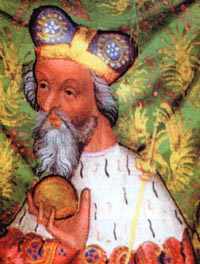
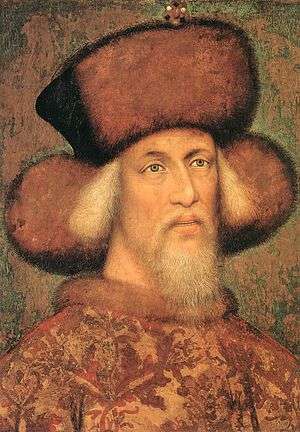
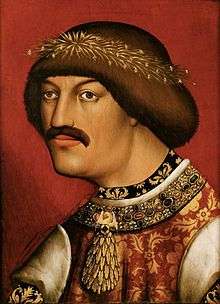

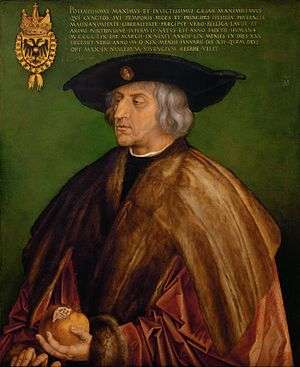
.jpg)



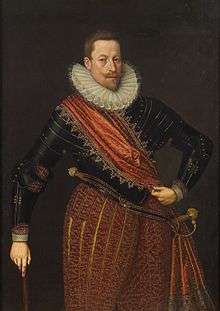
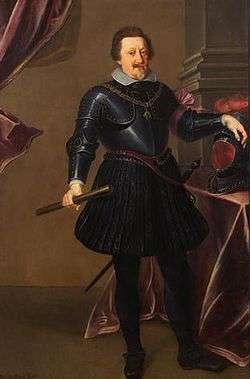
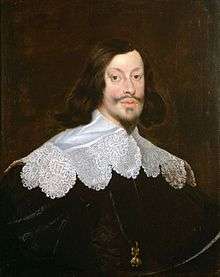
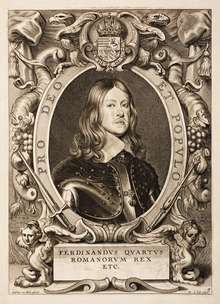
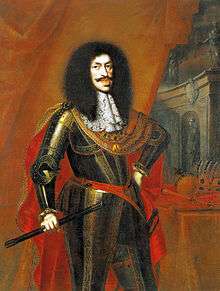
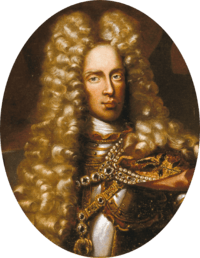
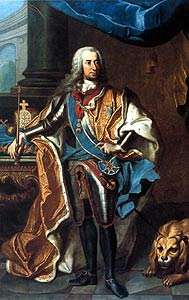
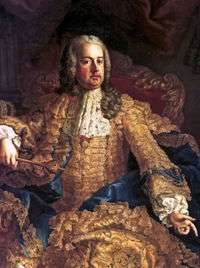
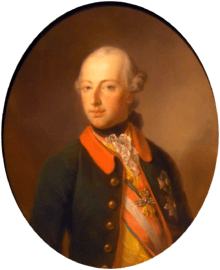
.png)
